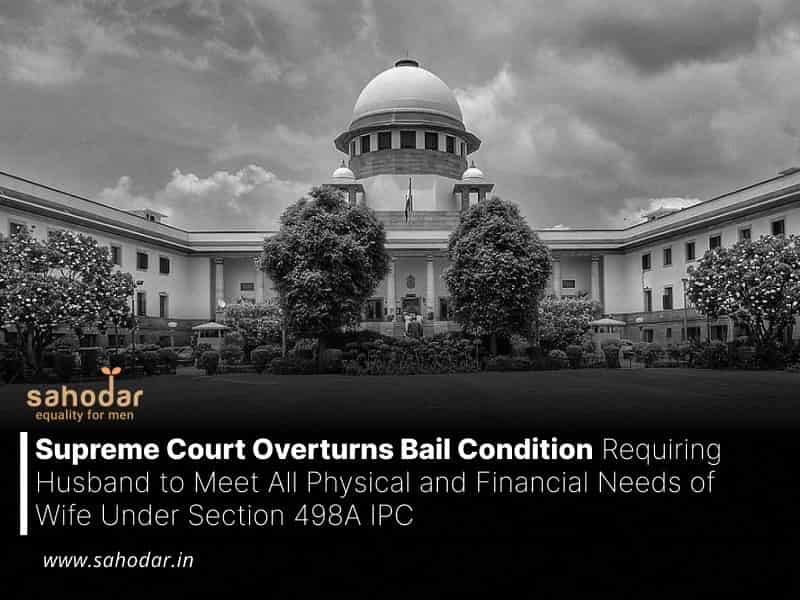The Supreme Court highlighted the importance of being careful when setting conditions for anticipatory bail, especially in cases related to matrimonial disputes. This came up when the Court overturned strict conditions imposed by the High Court while granting provisional bail to a husband accused of criminal cruelty. In this situation, a wife had accused her husband of criminal cruelty, and to avoid arrest, the husband asked the Patna High Court for pre-arrest bail. The Court granted him provisional bail with certain conditions.
“Considering the desire of the parties, both the parties are directed to file a joint affidavit before the Court below to the effect that the parties have agreed to live together and petitioner must give specific statement in the said joint affidavit that he undertakes to fulfill all physical as well as financial requirement of the complainant so that she can lead a dignified life without any interference of any of the family members of the petitioner.”
This appeal was filed in the Supreme Court challenging the High Court’s order. Noting the “unfortunate instances of imposing very onerous conditions,” Justices C.T. Ravikumar and Prashant Kumar Mishra remarked:
“This is to be done warily, especially when the couple concerned who are litigating in divorce proceedings, jointly though lukewarmly, agreed to attempt to reconcile and re-unite.”
The Bench described the above condition as unrealistic and impractical. Regarding the condition that the husband’s family members should not interfere, the Court noted:
“One should not be oblivious of the fact that a boy or girl, will be bonded to kith and kins besides parents and siblings and such bonded relationships cannot be severed solely due to affine and affinity towards the affinal as also cognate relationships has to be taken forward with same cordialness. Relation through marriage sans support from both the families may not flourish but may perish..”
The Court noted that the couple was willing to reconcile and pointed out that they could only rebuild mutual respect, love, and affection in a supportive environment. The Court also mentioned that requiring one party to meet all the physical and financial needs of the other would not help create such an environment.
The Court stated:
“In view of the unfortunate instances imposing very onerous conditions, especially in cases which are nothing but an off-shoot of matrimonial discordance, we would reiterate the view that courts have to be very cautious in imposing conditions while granting bail upon finding pre-arrest bail to be grantable…
In short, we stress upon the need to put compliable conditions while granting bail, recognizing the human right to live with dignity and with a view to secure the presence of the accused as also unhindered course of investigation, ultimately to ensure a fair trial.”
The Supreme Court also referenced landmark rulings, including Shri Gurbaksh Singh Sibbia & Ors. v. State of Punjab (1980) 2 SCC 565. In that case, the Court had noted that denying bail restricts personal liberty, and therefore, the court should avoid imposing unnecessary restrictions. The Court further stated:
“An over-generous infusion of constraints and conditions which are not to be found in Section 438 can make its provisions constitutionally vulnerable since the right to personal freedom cannot be made to depend on compliance with unreasonable restrictions. The beneficent provision contained in Section 438 must be saved, not jettisoned.”
The Court also referred to the 2020 Supreme Court case Parvez Noordin Lokhandwalla v. State of Maharashtra & Anr. It stressed that bail conditions should be reasonable and achievable. The Court highlighted the principle that the law should not force someone to do something impossible.
“We are constrained to refer to the said maxim on being pained to see that despite a catena of decisions deprecating the practice of putting onerous conditions for pre-arrest bail such orders are being passed without giving due regard to the binding precedents.,” the Court stated.
Given these facts and circumstances, the Court made the husband’s bail unconditional and emphasized that both parties should work towards restoring their domestic life.
“The conditions as mentioned above contained in paragraph 6 of the impugned order for the release of the appellant on the provisional bail cannot be sustained and as such the said conditions to give undertaking that the appellant would fulfil all physical and financial requirements by way of an affidavit are set aside,” the Court observed.

